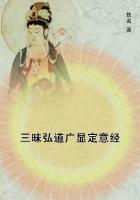Do not expect me to answer this, fathers.If you have got no common sense, I am not able to furnish you with it.All who possess any share of it will enjoy a hearty laugh at your expense.Nor will they treat with greater respect your third proof, which rests upon the following words, taken from the Book of Frequent Communion: "In the eucharist God vouchsafes us the same food that He bestows on the saints in heaven, with this difference only, that here He withholds from us its sensible sight and taste, reserving both of these for the heavenly world." These words express the sense of the Church so distinctly that I am constantly forgetting what reason you have for picking a quarrel with them, in order to turn them to a bad use;for I can see nothing more in them than what the Council of Trent teaches (sess.xiii, c.8), namely, that there is no difference between Jesus Christ in the eucharist and Jesus Christ in heaven, except that here he is veiled, and there he is not.M.Arnauld does not say that there is no difference in the manner of receiving Jesus Christ, but only that there is no difference in Jesus Christ who is received.And yet you would, in the face of all reason, interpret his language in this passage to mean that Jesus Christ is no more eaten with the mouth in this world than he is in heaven; upon which you ground the charge of heresy against him.You really make me sorry for you, fathers.Must we explain this further to you? Why do you confound that divine nourishment with the manner of receiving it? There is but one point of difference, as I have just observed, betwixt that nourishment upon earth and in heaven, which is that here it is hidden under veils which deprive us of its sensible sight and taste; but there are various points of dissimilarity in the manner of receiving it here and there, the principal of which is, as M.Arnauld expresses it (p.3, ch.16), "that here it enters into the mouth and the breast both of the good and of the wicked," which is not the case in heaven.And, if you require to be told the reason of this diversity, I may inform you, fathers, that the cause of God's ordaining these different modes of receiving the same food is the difference that exists betwixt the state of Christians in this life and that of the blessed in heaven.The state of the Christian, as Cardinal Perron observes after the fathers, holds a middle place between the state of the blessed and the state of the Jews.The spirits in bliss possess Jesus Christ really, without veil or figure.The Jews possessed Jesus Christ only in figures and veils, such as the manna and the paschal lamb.And Christians possess Jesus Christ in the eucharist really and truly, although still concealed under veils."God," says St.Eucher, "has made three tabernacles: the synagogue, which had the shadows only, without the truth; the Church, which has the truth and shadows together; and heaven, where there is no shadow, but the truth alone." It would be a departure from our present state, which is the state of faith, opposed by St.Paul alike to the law and to open vision, did we possess the figures only, without Jesus Christ; for it is the property of the law to have the mere figure, and not the substance of things.And it would be equally a departure from our present state if we possessed him visibly; because faith, according to the same apostle, deals not with things that are seen.And thus the eucharist, from its including Jesus Christ truly, though under a veil, is in perfect accordance with our state of faith.It follows that this state would be destroyed, if, as the heretics maintain, Jesus Christ were not really under the species of bread and wine;and it would be equally destroyed if we received him openly, as they do in heaven: since, on these suppositions, our state would be confounded, either with the state of Judaism or with that of glory.Such, fathers, is the mysterious and divine reason of this most divine mystery.This it is that fills us with abhorrence at the Calvinists, who would reduce us to the condition of the Jews; and this it is that makes us aspire to the glory of the beatified, where we shall be introduced to the full and eternal enjoyment of Jesus Christ.From hence you must see that there are several points of difference between the manner in which he communicates himself to Christians and to the blessed; and that, amongst others, he is in this world received by the mouth, and not so in heaven; but that they all depend solely on the distinction between our state of faith and their state of immediate vision.And this is precisely, fathers, what M.Arnauld has expressed, with great plainness, in the following terms: "There can be no other difference between the purity of those who receive Jesus Christ in the eucharist and that of the blessed, than what exists between faith and the open vision of God, upon which alone depends the different manner in which he is eaten upon earth and in heaven." You were bound in duty, fathers, to have revered in these words the sacred truths they express, instead of wresting them for the purpose of detecting an heretical meaning which they never contained, nor could possibly contain, namely, that Jesus Christ is eaten by faith only, and not by the mouth; the malicious perversion of your Fathers Annat and Meynier, which forms the capital count of their indictment.Conscious, however, of the wretched deficiency of your proofs, you have had recourse to a new artifice, which is nothing less than to falsify the Council of Trent, in order to convict M.Arnauld of nonconformity with it; so vast is your store of methods for making people heretics.This feat has been achieved by Father Meynier, in fifty different places of his book, and about eight or ten times in the space of a single page (the 54th), wherein he insists that to speak like a true Catholic it is not enough to say, "I believe that Jesus Christ is really present in the eucharist," but we must say, "I believe, with the council, that he is present by a true local presence, or locally." And, in proof of this, he cites the council, session xiii, canon 3d, canon 4th, and canon 6th.Who would not suppose, upon seeing the term local presence quoted from three canons of a universal council, that the phrase was actually to be found in them? This might have served your turn very well, before the appearance of my Fifteenth Letter; but, as matters now stand, fathers, the trick has become too stale for us.We go our way and consult the council, and discover only that you are falsifiers.
同类推荐
热门推荐
妖孽别跑:女皇陛下万万岁
什么叫运气好?买本书都能穿越就叫运气好!什么叫运气差?穿越之后宫斗宅斗一起来就叫运气差!什么叫桃花运?走到哪里都有美男环绕就叫桃花运!什么叫桃花劫?因为美男无数次险象迭生就叫桃花劫!什么叫女皇养成手册?把一个单纯善良的萌妹子变成一个坐拥天下高冷狠绝的女皇就叫女皇养成手册!小剧场~苏颜一直都很好奇这个总以天下为重的妖孽为什么会在她与天下之间选择了她。苏颜:“你老实回答我,我和天下到底谁重要?”某妖孽:“江山如画,不及美人如花。”苏颜(黑了脸色):“说,如花是谁?!”某妖孽:“………”我本是狼:披着羊皮的皇后
她一出生就被家族遗弃,成为狼孩,却帮助当今皇上夺得了帝位,不料惨遭他人毒手,本属于她的皇后之位被人冒名顶替。她的一生,原本将永远会是一片黑暗。一个来自现代特种兵的灵魂占据了她的身体,她聪慧过人,披着一张花狼王妃的表皮,巧妙地隐藏了自己,步步将天下掌控于手中……【本故事纯属虚构,如有雷同,纯属巧合】















